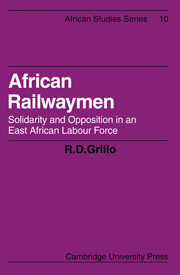Book contents
- Frontmatter
- Contents
- List of figures
- List of tables
- Acknowledgements
- List of abbreviations
- Fig. 1 Kampala City: main urban area and suburbs
- Fig. 2 The EARH Housing Estate at Nsambya and immediate environs
- Introduction
- 1 The social and economic framework
- 2 The railway community in East Africa and at Kampala
- 3 Towards an African proletariat?
- 4 Social relationships and the industrial framework
- 5 Status, reputation and class
- 6 Social mobility: strategies for success and responses to failure
- 7 Urban associations and competition for status
- Conclusion
- Appendixes
- Notes
- List of references
- Index
2 - The railway community in East Africa and at Kampala
Published online by Cambridge University Press: 04 August 2010
- Frontmatter
- Contents
- List of figures
- List of tables
- Acknowledgements
- List of abbreviations
- Fig. 1 Kampala City: main urban area and suburbs
- Fig. 2 The EARH Housing Estate at Nsambya and immediate environs
- Introduction
- 1 The social and economic framework
- 2 The railway community in East Africa and at Kampala
- 3 Towards an African proletariat?
- 4 Social relationships and the industrial framework
- 5 Status, reputation and class
- 6 Social mobility: strategies for success and responses to failure
- 7 Urban associations and competition for status
- Conclusion
- Appendixes
- Notes
- List of references
- Index
Summary
In East Africa the average urban employee is likely to be better off in terms of cash income than his compatriot gaining a living through peasant farming. The urban labour force as a whole, therefore, represents something of an elite minority. As we shall see later, railwaymen are generally better paid than other workers: a fact which places them in an advantageous position in the urban situation. On these and other grounds railwaymen constitute a special segment of the industrial labour force. A further contrast which may be drawn between railwaymen and other workers derives from the organisation of employment in the EARH, for railwaymen may be said to form a distinct industrial community in East Africa.
Whether one is willing to apply the term ‘community’ to the labour force of the EARH depends in the end on which of several dozen definitions one finds acceptable (cf. Hillery 1955). Although territorial aggregation is not a necessary component of an agreeable definition – some communities transcend physical boundaries – railwaymen in fact constitute a series of local communities, for, as we shall see, it is EARH policy to maintain closed housing estates for its workers wherever they are stationed. There are, however, more salient reasons for supporting an application of the term to the people who are the subject of this monograph. All railwaymen, wherever they are stationed, share a common interest and experience derived from the industrial milieu in which they operate.
- Type
- Chapter
- Information
- African RailwaymenSolidarity and Opposition in an East African Labour Force, pp. 19 - 35Publisher: Cambridge University PressPrint publication year: 1974



